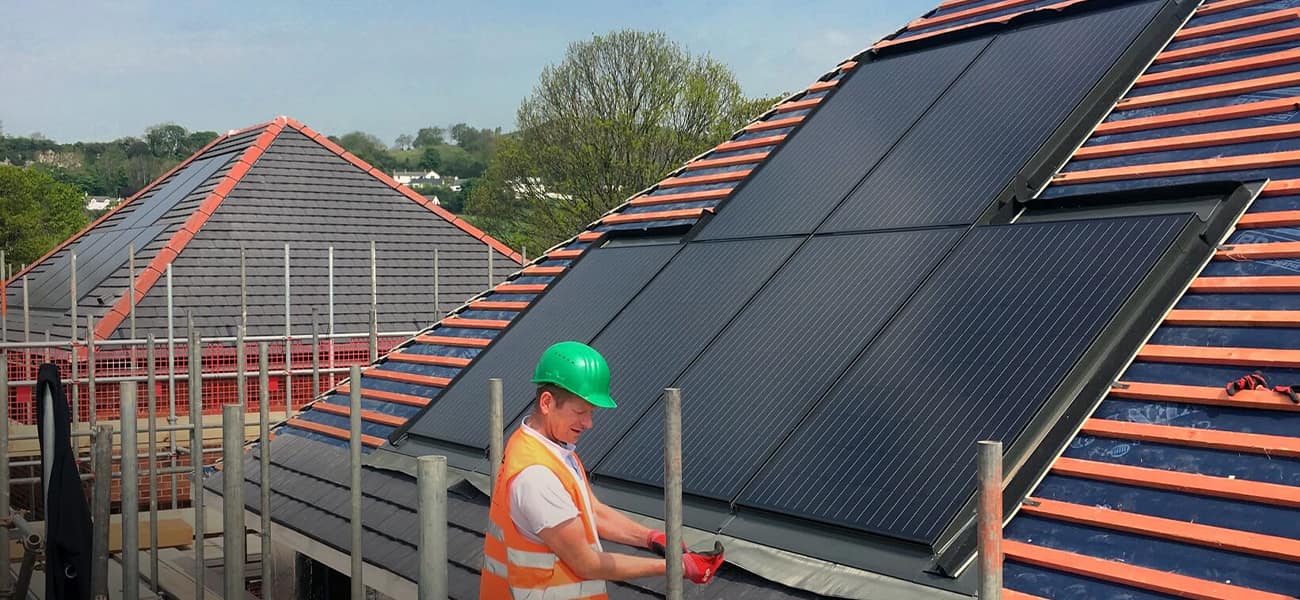Upskilling your workforce for Solar PV

With Solar Energy UK predicting that Part L changes could lead to a five-fold increase in the number of new homes built with solar technology, there has never been a better time for roofing contractors to add solar PV to their services.
The new Part L changes, which require new homes to produce 31% less carbon emissions, are due to come into effect from June 2022, leaving roofing contractors, who don’t already offer solar, with just under a year to prepare for the opportunity.
While the idea of becoming registered to be a solar installer can seem quite daunting at first, it is a fairly straightforward process. Here, we answer some of the FAQ's that contractors have about solar installation and certification:
1 – Do I have to be MCS (Microgeneration certification scheme) accredited?
You don’t have to be MCS accredited to install the integrated Marley SolarTile® system. It is designed with a simple push fit connection and effectively replaces a section of roof tiles, so it is very easy for contractors to install and acts as a MCS 012 approved building material. However, the final connection and sign off must still be done by a contractor with MCS certification. So you can either get accreditation for your roofing business, or form a partnership with an electrical contractor to offer joint services to your customers.
2 – What are the advantages of being MCS Certified?
The installation of solar PV panels, as well as the electrical connection, must be signed off by an MCS Certified installer. Being MCS Certified means you can fulfil this yourself. You must be fully trained as an electrician to complete the electrical connection, but even if you are not, being MCS certified means you can manage the whole process, source an electrical contractor of your choice, and remain in control of the pricing of the whole roofing project. As well as giving your customers confidence, peace of mind and consumer protection, the certification can also help you grow your business, as people will often search for an MCS registered installer. In addition, being able to offer a full roof system installation, including solar, puts your business at an advantage because it means housebuilders wouldn’t need to engage different contractors.
3 – How do I become MCS Certified?
To apply, you will need to get the appropriate training for solar PV connection and apply to a certification body to arrange assessment. The MCS website provides a list of the approved solar training courses that you can go on. More information can be found at https://mcscertified.com.
4 – What do I have to do to become certified?
There are four separate elements that are needed in order to be MCS Certified (as listed on the MCS Certified website):
1. A commitment to quality workmanship - All MCS installers will be assessed against the MCS 001 Standard and the specific technical standard for solar. Your company will be assessed by a certification body to ensure you install solar in line with the MCS standards.
2. A commitment to customer care - Prior to completing your MCS assessment, you need to belong to a Trading Standards Institute (TSI) approved consumer code. So the first step is to apply to join either the Renewable Energy Consumer Code (RECC), or the Home Insulation & Energy Systems Quality Assured Contractors Scheme (HIES)
3. Demonstrating competency - There are two ways that you can prove the competency of your employees. The first way is via in date qualifications held and/or short courses attended. The list of accepted qualifications and courses is included in the MCS Competency Guide. The second way is to prove competency through demonstrating experience to your MCS Certification Body.
4. Quality management system - Part of the process of becoming MCS Certified includes demonstrating the operation of a Quality Management System (QMS). The assessing Certification Body will ensure that your company has addressed the Standard requirements through documented procedures and systems.
5 – How long does it take?
Most of the time is spent in the preparation, making sure you have undertaken the correct training and have the right standards in place. Once you are ready for inspection, it will usually take between 4-6 weeks from the date of request for an MCS inspector to come out.
6 – How much does it cost?
The application is normally £595 + VAT for the company, it isn’t needed for each individual. As part of our ‘Supporting the Roofer’ initiative, all roofing businesses can claim a £50 discount on their MCS certification application in preparation for changes to Part L of the Building Regulations.
Disclaimer - The information shared in this blog is correct at the time of publication. Guidance, standards, and best practices may change over time, so if you’d like further clarification or the latest updates, please get in touch with the Marley Technical Advisory Team, who will be happy to help.
Category: FAQs Roofing Solar Roof Tiles Sustainability